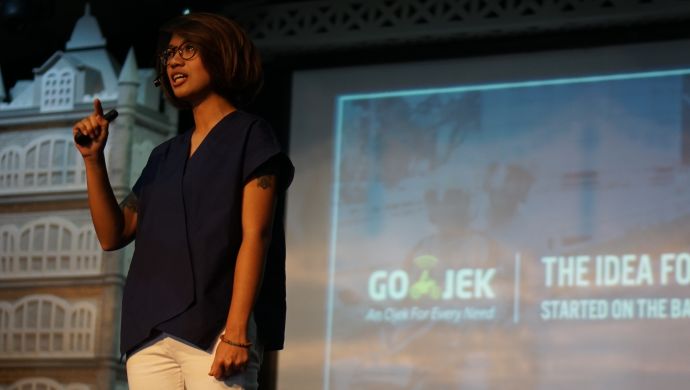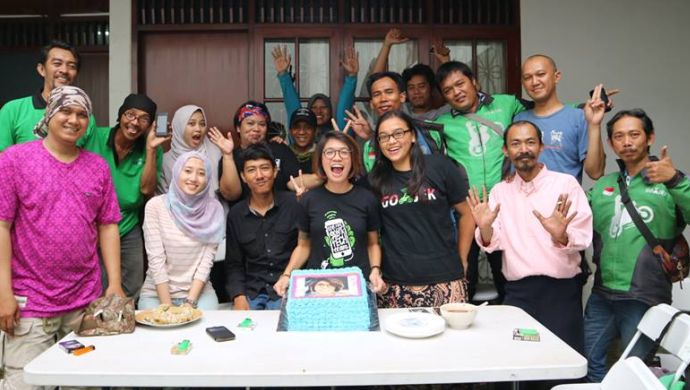Former Go-Jek VP of Product Alamanda Shantika opens up about her new projects, leadership style, and a certain street kid named Rio

Alamanda Shantika (Image Credit: Kibar.id)
When Alamanda Shantika joined Go-Jek in 2014, the ride-hailing startup was just beginning its journey. At the time, the only means in which to get their service was through a call centre.
An engineer and a graphic designer by training, Shantika’s job was to build a mobile app that allowed users to contact ojeks (motorbike taxis) for services such as food delivery or personal shopping.
“My mother asked me, ‘Are you sure you want to do this, taking care of ojek drivers?’ and I changed my mind for a while,” she once explained at a startup event. “But Nadiem [Makarim, Go-Jek CEO] immediately persuaded me to change my mind.”
The startup then became a big hit in 2015. It secured unicorn status in 2016 after raising more thanUS $550 million in funding, and branched out into at least eight offices in Jakarta, Jogjakarta, and even Bangalore after the acquisition of Indian companies C42 Engineering, CodeIgnition, and Pianta.
Also Read: The four times Go-Jek made the news — and why this time should be a trigger for change
Last week, Shantika resigned from the company, leaving the public wondering why she decided to leave – and where she was going.
After a short silence, the 27-year-old sat down with e27 to discuss her new role, leadership style, and her passion in helping others succeed.
Here is the edited excerpt of the interview.
What pushed you to leave Go-Jek and start anew?
We can say that it was all because of Go-Jek itself. All the dreams that I have managed to realise now are all thanks to Go-Jek.
When I started with Go-Jek, I did not have dreams as big as I have now, but then I see how Go-Jek has become a role model for Indonesia … People are looking up to Go-Jek, especially at startup events.
It was as if my baby was already born and had started to learn to walk. Now it’s time for me to raise new babies–helping new babies to be born through 1000 Startup.
So what exactly you are going to do in 1000 Startup?
The main idea is to help with the big picture of the programme itself, how to become better, and identify any improvements that we can make.
I will be speaking from the perspective of someone who had built a startup. For example, how does one built an engineering team?
We already have a pool of young talents who are ready to build their own startups. But in the end, they need guidance on the execution. That’s the part that I am going to play.
Also Read: Can Uber survive against Go-Jek, Grab, and the Government?
You have been dubbed by the media as “the mother of ojek drivers” due to your friendly approach in dealing with Go-Jek drivers. You even had a special Whatsapp group to communicate with them. What is your approach to leadership in a team?
One thing that I learned in Go-Jek is that leadership is all about adding value to various people, and also about creating new leaders. Before that, I was far from being in that stage. [It was] only in Go-Jek that I learned the idea that a leader must create new leaders.
This is why I am leaving Go-Jek in order to build another one thousand startups, and to create more leaders than [I would be able to at] Go-Jek.
What is the most valuable lesson you had in Go-Jek, that you are going to implement in your new job?
There are many things that I learned from Nadiem: his fearlessness, his speed. One of Go-Jek’s company values is to be ‘fast and fearless’. He always told us to turn our anxiety into power.
Like when we were about to launch a driver app, everybody was saying, “There’s no way you can give ojek drivers an Android device!”
But our fearlessness enabled us to continue, and it turned out we were capable of it. So when I left Go-Jek, I told everyone that you should remain fearless. There are many issues that we are facing, but you have to be fearless, dare to speak up.
Go-Jek was a turning point in my life.
It turns out that we live not only to make money. It was great to be able to help people, which is why now I want to be able to help more people.
Working in 1000 Startup will be like doubling what I have created in Go-Jek. Go-Jek was able to support the life of 250,000 people; imagine if we can build another one thousand just like that.
Also Read: Developing: Go-Jek and taxi company Blue Bird to announce partnership

Go-Jek drivers paid a visit to say goodbye to Shantika when she left the company (Image Credit: Personal Facebook page)
So what will happen in 1000 Startup in the next year? What is the greatest challenge the movement is facing?
We have added several new additions in the hackathon stage.
There is also the need to remind participants that they should not be doing it to follow a trend. I always say, “It’s cool to be Nadiem, but it’s never easy.” Are you mentally ready to do this? Being a CEO is more than just paying people’s salaries.
I am also taking an advisory role for a startup in the fashion industry.
I founded my own startup called Pentool Studio, which buids e-commerce websites for local fashion companies. I have always been into fashion, and I want to build a fashion hub where people can gather to design products. I have a manufacturer called Nama Studio, and also a production service called Pijar Imaji Indonesia.
These are all places to train myself, to continue on putting myself in the position of a founder.
There is also this kid named Rio; he sells newspapers at this traffic light in Pondok Indah. I often eat together with him on weekends because I’m single (laughs).
Rio is going to enter junior high school soon, and he told me that he does not want to sell newspapers anymore. So I thought, what can these kids do to support themselves? I thought about creating a library like I did in high school, but what they need now is to make money.
So I initiate this Es Potong Royong programme. We are going to help with branding and social media marketing, and we are going to create a comic series about these street kids’ journey.
We will mentor these kids on how to run the business. It will basically be a social franchise.
I noticed that in your work, you tend to approach the grassroots level communities. There is always an element of social business.
It started from childhood. My father ran a safe house for street kids, and he always brought me to meet with them.
What’s the legacy that you want to leave behind for Indonesian tech startup community? How do you want to be remembered?
I don’t want to be remembered, actually. At least not as a person. I’d rather be remembered by the knowledge I’ve shared.
There is just one legacy that I want to leave behind: In this life, try to live for as many people as possible. Don’t just live for yourself. There are many who need our help.
—
The post Exclusive: She was the mastermind behind the Go-Jek app, now she’s out to help others succeed appeared first on e27.